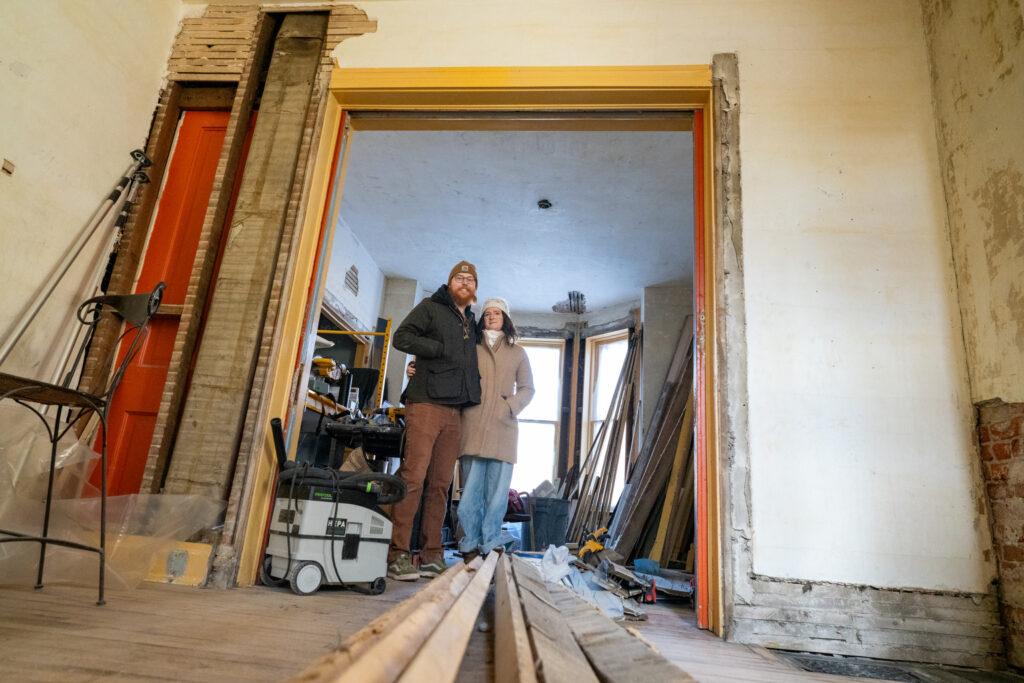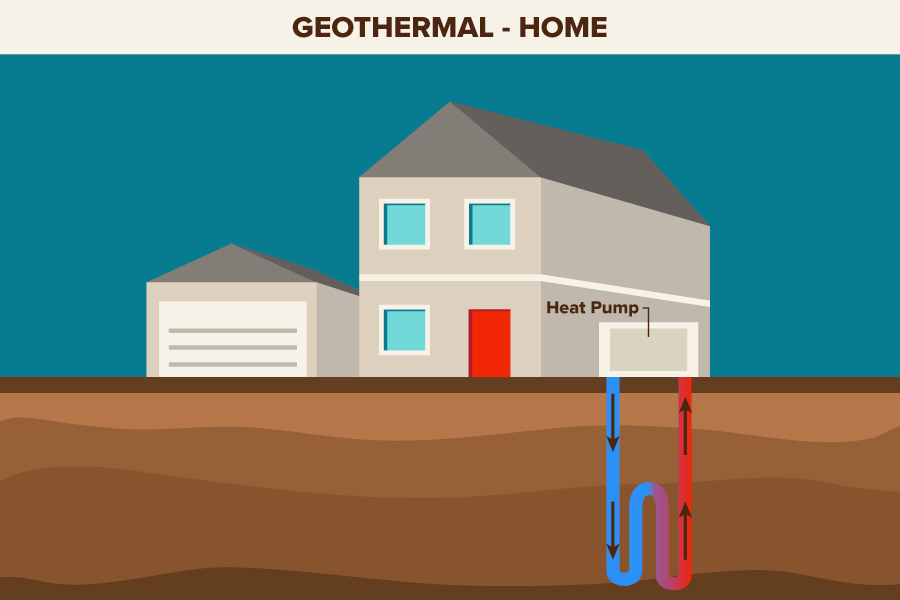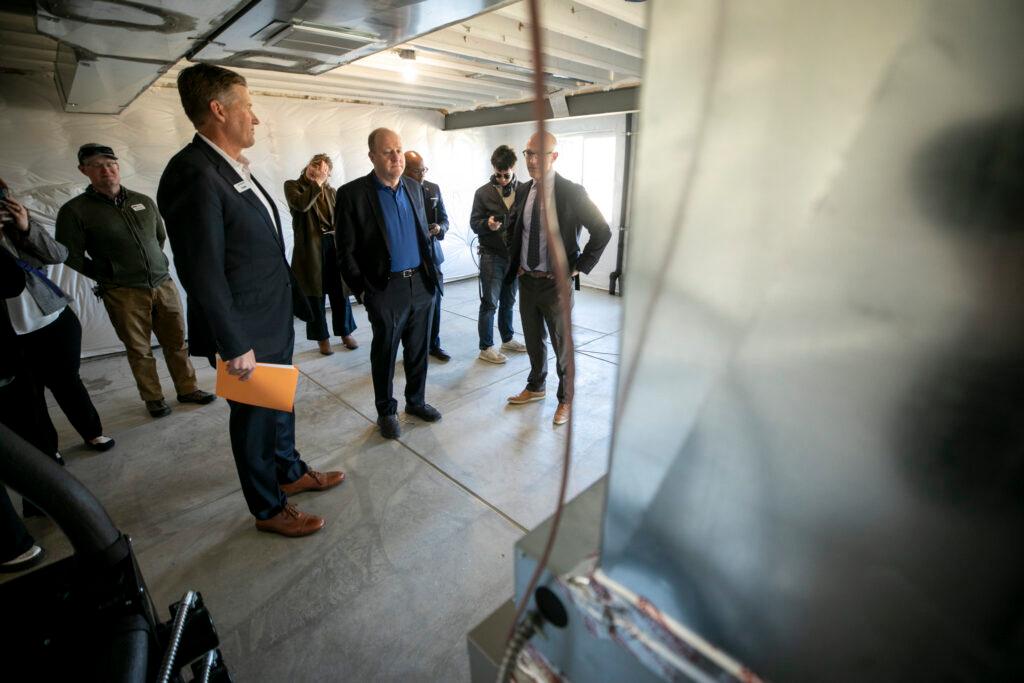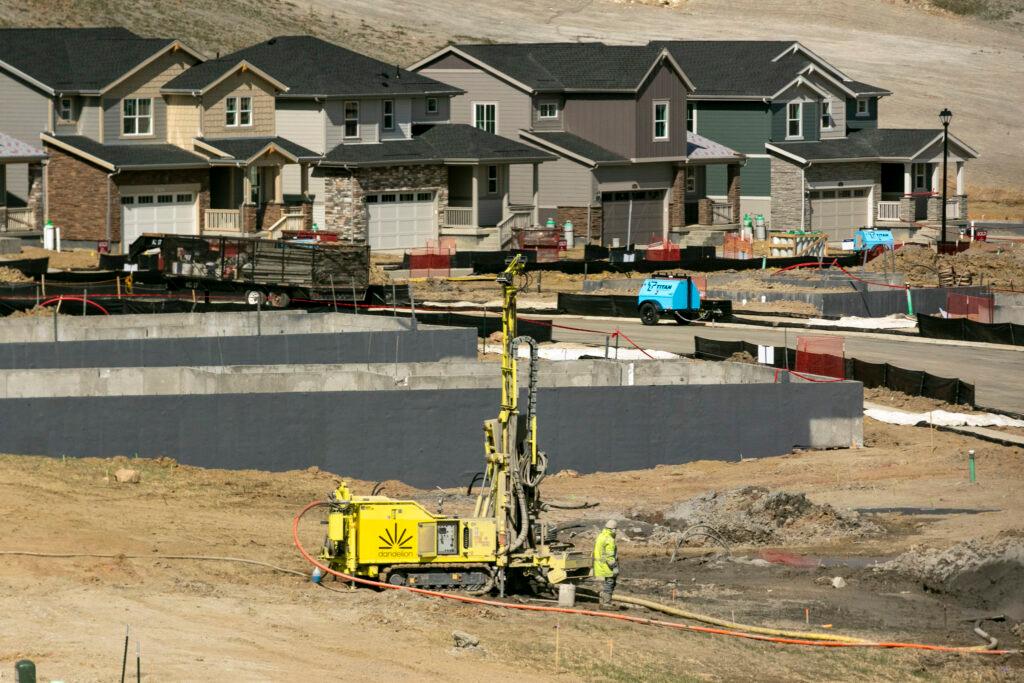
This story is part of the Hotspots series exploring Colorado's geothermal energy industry by CPR's Climate Solutions Team. Explore the series here.
On a frigid afternoon last December, Jim and Hilary Denton watched with excitement as a compact drilling rig tore into their small backyard in downtown Denver.
The couple had resolved to renovate their 1880s townhome into a model for climate-friendly living. By hiring a crew to bore two 400-foot holes, they planned to tap into a plentiful supply of clean energy hiding just below the Earth’s surface.
“I posted an image of this on Instagram yesterday, and a couple of people asked: ‘What is that? What is geothermal? Are you tapping into magma?’” Jim Denton said. “I don’t think people know this exists as an option.”
The drilling project marked the most intensive step in their plan to install a geothermal heat pump. The systems harness stable underground temperatures — usually around 50 degrees Fahrenheit year-round — to warm and cool buildings. In the winter, the machines use electricity to draw energy indoors, then reverse the process to push heat into the ground during the summer.
Geothermal heat pumps offer homeowners one way to ditch fossil fuels that’s far more energy efficient than other electric heating and cooling options. The downside is the upfront price tag: the systems cost around $19,000 for a typical household, according to the U.S. Department of Energy.
Prices can run far higher depending on the region and specific property. The Dentons, for example, paid around $54,000 for their ground-source heat pump system even after taking advantage of a federal tax credit.

The couple managed the cost thanks to their dual incomes as software engineers. They hope the decision will shrink their climate impact and boost the young home geothermal industry, helping less affluent homeowners afford the technology in the future.
It’s a goal shared by Gov. Jared Polis, who sees ground-source heat pumps as a critical tool to assist Colorado’s broader climate strategy. His administration is working with homebuilders and entrepreneurs to pull home geothermal out of its eco-luxury niche and into the mainstream.
Why Colorado digs home geothermal
The governor is far from the first person to recognize the potential benefits of home geothermal.
A 2024 U.S. Department of Energy analysis found that only 1.3 million of the nation’s households — roughly one percent — have a ground-source heat pump.
Meanwhile, 13 percent of homes depend on an air-source heat pump, which uses the same basic process to exchange energy between a building and the outdoor air. Air-source heat pumps are more affordable, which is one reason the appliances now outsell natural gas furnaces, according to the Air-Conditioning, Heating and Refrigeration Institute.
Both types of heat pumps cut climate-warming emissions by replacing fossil fuels, but normal weather variations pose a challenge for air-source systems. When temperatures surge in the summer or plummet in the winter, air-source heat pumps work far harder to keep residents comfortable, increasing energy bills and taxing the power grid. Ground-source heat pumps avoid the issue by reaching below the Earth’s surface.
That efficiency also doesn’t only cut energy bills for individual residents. Will Toor, the director of the Colorado Energy Office, said if more households adopt geothermal, utilities could skip building additional transmission and distribution lines to support growing electricity demand. All ratepayers could avoid paying higher bills as a result.
“The benefits to the grid really are significant,” Toor said.

A 2024 analysis published by the National Renewable Energy Laboratory came to a similar conclusion. If 70 percent of U.S. buildings installed additional insulation and geothermal heat pumps, it found the country could avoid building 24,500 miles of transmission lines — a distance roughly equal to crossing the continental U.S. eight times.
In the last few years, Gov. Jared Polis has approved incentives to cut the cost of home geothermal systems and take advantage of those potential benefits.
One bill created a state tax credit worth $3,000 for new geothermal heat pumps. A separate bill required natural gas utilities to establish plans to cut their climate impact. As a result, Xcel Energy, Colorado’s largest gas and power provider, recently tripled its heat pump rebates and now offers its customers a discount worth between $9,000 and $12,000 for a ground-source heat pump system sized for a typical home.
The rise of geothermal subdivisions
All those discounts, however, only go so far without a workforce to install home geothermal systems.
Xcel Energy lists 17 companies offering ground-source heat pumps eligible to receive its discounts. Those installers have even fewer options for subcontractors ready to drill geothermal wells on residential properties. Jim Denton, for example, said he had to wait eight months for Colorado Geothermal Drilling to bring their rig to his home in Denver.
The situation could soon change due to the arrival of a leading home geothermal startup: Dandelion Energy. Until recently, the company limited its operations to the East Coast.
But in early April, the Google spinoff unveiled a partnership with major U.S. homebuilder Lennar to make Colorado a testbed for residential geothermal. By combining forces, the companies now plan to install 1,500 ground-source heat pumps at new homes in Metro Denver over the next two years.
Kathy Hannun, the co-founder and president of Dandelion Energy, said the project marks the single largest deployment of home geothermal systems in the U.S. It’s also part of a broader strategy to bring down the cost of the technology.
“When you install 1,500 of something in a row, you can optimize your processes so that it's much less expensive than a one-off system,” Hannun said.


The project is well underway at Lennar’s Ken-Caryl Ranch development in Littleton. In early April, Hannun stood in one home with a geothermal system already installed in the basement. A nearby window provided a view of other future home sites, each with a pale yellow Dandelion Energy rig drilling wells in a cleared lot below the foothills.
Once Dandelion Energy establishes a foothold in Colorado, Hannun says it might start offering its services for existing homes here, not just new buildings. That decision, however, will depend on whether the federal government maintains its 30 percent tax credit to offset the cost for homeowners.
President Trump has left government support for home geothermal intact so far. The discount was increased by the Inflation Reduction Act, the landmark climate law signed by President Biden in 2022. The Trump administration has targeted other funding authorized by the legislation.
In the meantime, Polis made it clear that Colorado plans to maintain its support. At a windy ribbon-cutting ceremony at the Littleton development, he told the audience his administration would do whatever it could to make home geothermal even more accessible across the state.
“It's good for our economy, good for homeowners, good for our climate, good for our air quality,” Polis said.









